‘Be an accomplice’: the final installment of the Queer Ad Folk trilogy
Queer Ad Folk is a project created by John Osborne and Oli Rimoldi in partnership with Outvertising that shines a light on LGBT+ talent in the advertising industry, helping up-and-comers see people like themselves thriving out there.
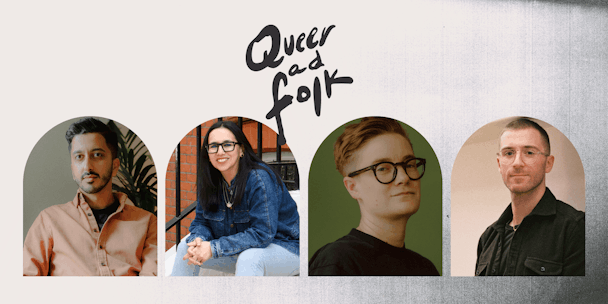
The third installment in the Queer Ad Folk trilogy is here
The third installment in our Queer Ad Folk trilogy is here. We hope you’ll agree that we’ve maintained Toy Story level consistency throughout the series.
And that’s all down to our brilliant queer interviewees, a fantastic bunch of queer photographers – Roxy Lee, Hidhir Badaruddin, Joshua Onabowu, and Daniele Fummo – organized by Millie Yoxen at Object&Animal, and our talented queer designers Luke O’Prey and Oded Shein. Major props to all.
Queer Ad Folk will return soon, but for now let’s enjoy the Season One finale with Chaka Sobhani, Tom Trevelyan, Rachel Hamburger and Asad Dhunna.
Chaka Sobhani, chief creative officer at Leo Burnett
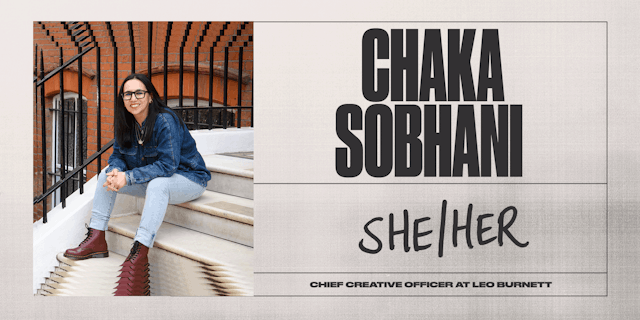
Have you always been ‘out’ at work?
“Yeah, 100%. I never really had a coming out, I just grew up with boyfriends and girlfriends, and would have identified as bi. Now, I identify as queer because I think that’s a better descriptor for me. I guess I was used to being an outsider on a whole number of levels being the only brown kid in my community with a funny name growing up.
“I entered the creative world through production and television, and I think there was more of openness there – probably because there’s more visibility in front and behind the camera. So it wasn’t necessarily a place I had to hide. I knew who I was under that rainbow and could be open.
“That said, there were moments where I found myself using ‘they’ to describe a partner, and not in a non-binary way. You wouldn’t want to say your girlfriend didn’t exist, but I wasn’t comfortable either. That made me feel absolutely shit about myself, so pretty early on I made a promise to myself that I would never ever fucking live in the closet.”
Does being LGBT+ help you in your job?
“I think as outsiders and always fighting to be accepted, our levels of empathy and understanding of people is – not better or worse – just quite deep. We have to be sensitive to it because we can’t move in the world freely. We can’t. We come across bigotry and hate and discomfort as part of our day-to-day life. There are places in the world I can’t go with my wife and kids, there are parts of London I can’t hold my wife’s hand. It’s that understanding of what it feels like to be an outsider and constantly riding that emotional journey that I think makes you very tuned into how people feel.”
Would you say that advertising is open-minded?
“It’s necessarily less open-minded than other industries, but there’s still a long way to go. It’s simply less visible. By that I mean, when I worked in television there was more visibility of people who were very out and proud. Not so many in positions of power, although more than in advertising, but there wasn’t a day or week when I didn’t come in contact with someone from our community. Advertising, very broadly, doesn’t feel as progressive as television does because I think there are just more variety of people from different backgrounds in television and particularly production. Not saying it’s perfect by any stretch of the imagination, but it’s moderately better.”
Have you experienced LGBT+ phobia at work?
“I think we have a sixth sense of trouble, and as a result have a good radar of how to read a room and how people are going to respond to you. But you can still be surprised. Early on in my career, I remember hearing a conversation once at a post house, in the middle of Soho, where two women in the kitchen were making tea and talking about walking by these two guys kissing and were saying it was so disgusting. And you just get that feeling in the pit of your stomach because they’re basically saying you’re scum… even though you haven’t done anything! Someone just kissed someone they might love, or just wanted a shag?!
“Generally though, no, and I’ve been very lucky. I think it may also be how I carry myself – I try and be quite upfront. Unlike my ethnicity, being LGBT+ isn’t necessarily obvious. But one of my absolute defining features and the greatest love of my life is my family – my wife of 20 years and my children. So, unsurprisingly, within three minutes of any conversation, I’ll talk openly and freely about them so it’s out there quite naturally.”
Any words of wisdom for queer newcomers to the industry?
“I wish there were more where we were just included in the norm. Where we’re just part of the tapestry of the stories that you see. But I think Diesel has done a great job. ‘Francesca’ telling a story of transitioning, but with the twist at the end and the connotation of religion and how that plays out and all the conversations around that – it was impactful. A traditional medium for such an untraditional story. It also didn’t feel like it was created purely for controversy. It felt like a proper conversation starter to me and very true to the brand.
“Cadbury’s Creme Egg was also wonderful, just the irreverence of love and snogging. Thoroughly depressing that there were 33,000 complaints, but fantastic that they were rejected and the ad was allowed anyway. Renault also did an absolutely beautiful job.
“Not to take anything away from all the brilliant examples I’ve mentioned, but as I say, I would love to see us not having to always play out the same story of struggle. I’d like to see us happy. And experiencing all the different nuances of life. Like everyone else. That’d be nice!”
Tom Trevelyan, head of account management at Neverland
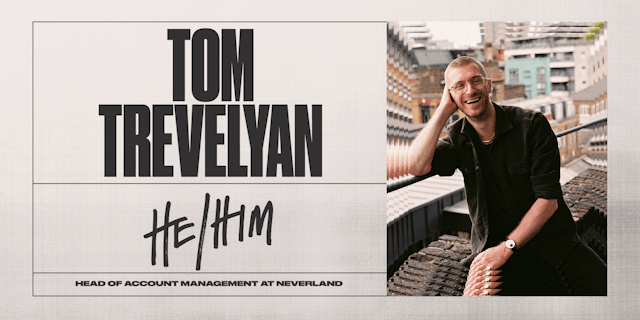
Have you always been ‘out’ at work?
“Yeah. I came out quite young, I think, for my generation – around 17. The cat was out of the bag and I couldn’t put it back in. So, when it got to being open at work, I was a bit like – fuck it, I’m gay! I wasn't necessarily that comfortable with it, to begin with. I didn’t talk about it much, but I felt it would be good for me, for my self-worth, to not hide it.”
Does being LGBT+ help you in your job?
“Definitely. Being a minority (and I’m so aware of my privilege when I’m saying this), it’s fucking awesome. I’m at a point in my life where I love being gay. It has been shit at times, and there are obviously things I can’t do because of it, but I love it because I’m different. I have a completely different perspective on the world. That’s so important for life, but especially in the creative industry. It’s set me up to think differently, interact with people differently, respect and be more conscious of how other people might be feeling. I work in client service, so that’s really helpful.”
Would you say that advertising is open-minded?
“The million-dollar question. I don’t think it is. I think it wants to be, there’s a lot of very good intention, and there’s plenty of change happening. But there’s still a long way to go. It takes time to change attitudes and understanding and to attract and keep talent who are not cis straight white men and women. Our industry has to change and has to properly reflect society – if it doesn’t, we’re going to make shit work.”
What’s the best way for colleagues to be good allies?
“You need to do the work. It shouldn’t be on us to explain everything. It’s not our job to tell you or the world who we are. We’re not responsible for any of the bigotry or hatred we face. Do some homework and then come and speak to us. I’m really happy to discuss anything with someone who is interested and open, but you need to do 50% of the work.
“On a more structural level, look at things in your business and ways of working, like gender references in documents that aren’t needed, or M/F signs on toilets.”
Any words of wisdom for queer newcomers to the industry?
“Look after yourself. That’s really key. I’m a middle-class, straight-passing cis white man – my privilege is off the scale – but that’s not the case for many people. I was able to be myself, even if I didn’t necessarily feel comfortable, and I could be it without repercussion. Nobody deserves to know anything about you. You shouldn’t feel forced to come out. Find people like you with whom you feel safe and stick with them. Be as open as you want to be.
“For those who feel comfortable, be unapologetically yourself, because you and people around you will learn and grow.”
Rachel Hamburger, strategy director at Lucky Generals
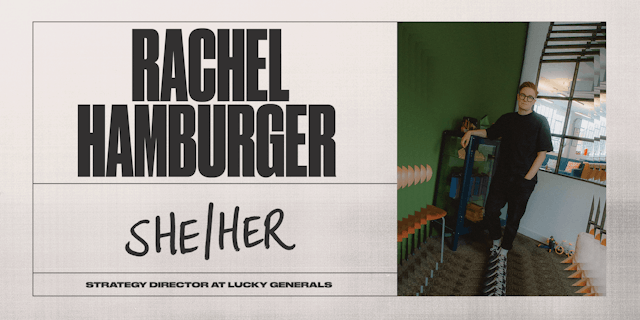
Have you always been ‘out’ at work?
“Yeah – I’ve always had this haircut, so I didn’t have much choice! I’ve been out since school, and it never felt like there was a dilemma about it. Beyond the odd moment, I never felt like there was a choice to be made between being out and being accepted, or successful in advertising. Never a conundrum. So I’ve been lucky in that way because I don’t think everyone would have had the same experience. Sometimes in advertising, agencies can be quite laddie – and if you’re not typically ‘one of the lads’ then yeah that could be hard.”
Does being LGBT+ help you in your job?
“Well, there are things that I don’t have to contend with, unlike many straight women in the industry. I don’t swim in a laddie stream or a girly stream, I swim in a different stream. I don’t have to be ogled or treated a certain way. I’ve sort of managed to bypass certain dynamics and expectations, and I’ve found that to be an advantage sometimes.
“I also think my generation is probably one of the first where there are advantages to being gay in this world and in your career. Before, the fear was life was going to be so much harder, getting a job and climbing the career ladder was going to be so much harder. That was the expectation. But now, I’d like to think from here on out that that isn’t the case any more.”
Have you ever seen someone like yourself in management?
“When I first started out in advertising – no. Nobody that I knew of was gay or lesbian. It wasn’t part of the fabric of advertising at that stage. I actually remember asking my friend, who worked at DDB when I started doing work experience there, whether it’d be OK that I was gay. It was a sort of anachronistic question, but the reputation was still quite Mad Men even as recently as 10 years ago. Of course, she told me to not be silly, and once I joined there was no problem.
“I didn’t think I struggled because of it – it was clear that it was an open environment. A naturally, quite progressive political place. At least in the agencies that I’ve been in. So I don’t think I saw it as a barrier. But I’d have loved to have known starting out that there were other gay people succeeding in advertising… which just wasn’t clear at all.
Have you experienced LGBT+ phobia at work?
“I don’t want to give a falsely glossy view of things, but no – I’ve really not felt like my sexuality has been a problem in advertising. I’ve worked a bit in politics and there it felt more present, as a thing. But, you know, there have been times where you’re working with clients and the culture is extremely traditional straight white male… and I turn up as, not only a woman but a slightly confusing woman to them because I’m on the slightly butch end of the spectrum, and they don’t quite know how to deal with me. You can feel that you’re slightly overlooked by typically macho clients. But I’ve always felt I’ve had the support of my agency.”
Any words of wisdom for queer newcomers to the industry?
“It’s different for different people, but I’m glad when I started in advertising that I said I was worried. Because it was quickly made clear to me that I didn’t have to be. I’m glad I didn’t have to work that out myself because I spoke to friends who were allies, and other gay people about it. That reassurance helped. And I’d like to reassure others that you don’t have anything to worry about, but if you do feel worried – don’t worry alone. You can talk to someone about it.”
Asad Dhunna, founder and chief exec at The Unmistakables
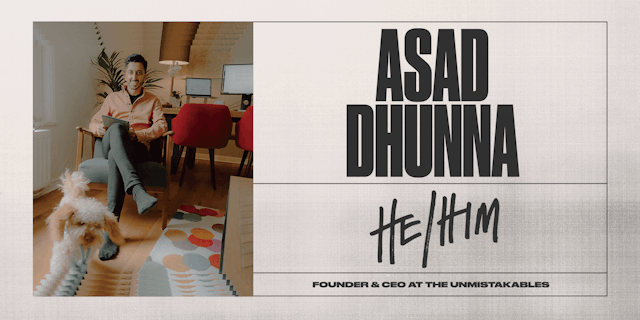
Have you always been ‘out’ at work?
“No, and ironically the first people I worked for were gay. But I just wasn’t out – I wasn’t ready. For the first couple of years, I did all the usual stuff like deferring questions about partners, and not making it about me. Then it was probably when I was about three or four years into my career that I came to terms with it myself. Over time, with the gay volunteer roles I’ve had, I learned that I could mention that I do them… and it’d kind of helpfully do the coming out for me!”
Would you say that advertising is open-minded?
“Advertising is well-meaning… but whether or not it’s open-minded is a very different conversation. My sense is there’s a bit of an identity crisis with advertising. Not just about identity itself, but media consumption, and how influence spreads. A planner, Jamie Inman, said to me that advertising has spent years building this particular utopian world – but that world isn’t what we want any more. And we aren’t all consuming a single focal point of advertising any more. So what I think we’ll see evolve over the years is a different kind of ‘ad man’ that will catch up and reflect that.”
Does being LGBT+ help you in your job?
“I believe it helps me see things as a slight outsider. To question what something is about, or why it is the way it is. It’s coming through so many lenses though – for example, as an Asian person and a gay person – that it’s probably all mixed together. Now I’m leading a company, what it makes me attuned to is, I think, how society is evolving. For example, what happened with Uefa and the Munich Stadium and the rainbow. That’s where I find a difference because I feel more informed on what that’s about.
“But probably the other area is a bit of humor. I would say I inject a bit of campness into things to lift the mood and not to take it all so seriously.”
Have there been any LGBT+ people in adland who inspire you?
“How I got into the world of PrideAM was seeing Scott Knox talk. I think it was at Google. And he talked about his family, his kids. And I just said to him ‘I’ve never heard that before – can I meet you and find out a bit more?’. Then life evolved from there. So, Scott is one. Mark Runacus is a great person who I’ve looked up to and thought – that’s a great role model of someone who wants to make change, and wants to make the industry a better place. So, yeah, there are certainly LGBT+ people I’ve looked up to. In the same way I’ve looked up to people who are Asian as well, to try and work out how they’ve navigated what I’m feeling – how they’ve done this, or that.”
What’s the best way for colleagues to be good allies?
“There are loads of different things that can be done. One is to understand what the sentiment, and the reality, for LGBTQ people is within the company – what does it feel like to work there, do people feel they have to go back in the closet? Another is using the rainbow responsibly. Is it being used in line with what the people who work there actually want? Then there’s also not expecting the community to do the work. LGBTQ people aren’t hired to be flag carriers and wavers – they’re hired to be strategists, creatives, whatever.
“Some of the provocations I give to people is to challenge the word ‘ally’. Because ‘ally’ is somewhat passive. Are you an ‘ally’? What proof do you have? What have you done? I challenge people to be more of an ‘accomplice’. Because what are you willing to stand up for? What are you willing to put your head above the parapet for? That changes the framing. Sure you’ve got your rainbow lanyard, but if you saw some homophobia in the workplace or someone being misgendered – what would you do or say?”
Any words of wisdom for queer newcomers to the industry?
“The warning I would give is that this isn’t going to be easy. The encouragement I would give would be that you’ll do fascinating work – and if that’s your bag, then go for it. The advice I would give is to embrace everything about yourself – and let that take time, as well. Your career is going to be quite a long time, it’s going to go through phases – ups and downs. Invest in therapy because it’s so worth it. For me that’s when I started to look at a load of limiting beliefs I had around being gay and what that meant – reframing that to say: ‘This is who I am. Oh, and I’m gay’.”
Big thanks to Sobhani, Trevelyan, Hamburger and Dhunna for taking the time to get involved.
If you’d like to get involved or know someone we should be featuring, slide into the DMs @QueerAdFolk or email us at queeradfolk@gmail.com.
Stay tuned for the next season of Queer Ad Folk!
As well as co-founders of Queer Ad Folk, John Osborne is a senior creative at Creature while Oli Rimoldi is creative director at Mother.
